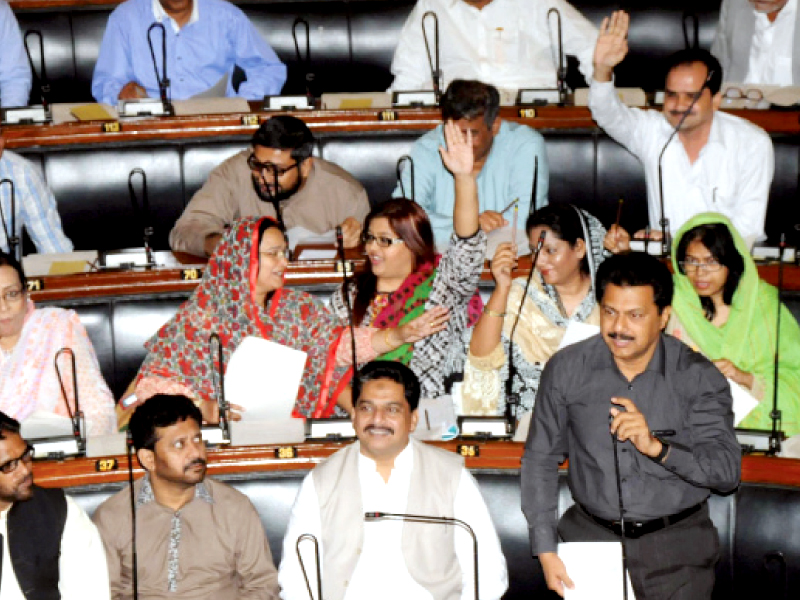
In light of the rising number of HIV/AIDs cases in Sindh, the lawmakers of the provincial assembly passed a law in Friday’s session to control the disease, adopt measures for its treatment and protect its patients.
Sindh parliamentarian and law minister, Dr Sikandar Mandhro, who moved the bill, said that since the health department has been devolved to the provincial government under the 18th Amendment, there was an immediate need to make a law to control the transmission of HIV and support the people living with this disease. “This preventive disease has killed more people than the atomic bombings in Hiroshima and Nagasaki in Japan. Unfortunately, no sincere efforts to control this disease have been put in place by the previous governments,” he said while citing that more than 60 million people die because of this disease every year in the world.
According to the law passed on Friday, the government will establish a Sindh AIDs commissions within 15 days of the act’s promulgation date. The commission will comprise two representatives of NGOs working in the filed of HIV/AIDs, a lawyer, one member from a civil society organisation working on social issues, one retired member of the law enforcement agencies or retired judge, the Sindh AIDs control programme and others. It will be responsible for undertaking and implementing all projects related to HIV/AIDs in the province. The chairperson of the commission and its secretary will be elected by the five-member governing body.
Say no to discrimination
Under the law, no person or organisation can discriminate against an individual on the basis of his or her HIV status.
“It will be unlawful to require or to coerce a person to be screened for HIV for the purpose of employment, promotion and training or benefit - either in public or private organisation,” the law said. “Any person, who violates the law, will be punishable with fine of Rs50,000.”
Every workplace, pubic or private, having more than ten employees shall undertake an HIV/AIDs awareness programme for the benefit of its employees at least once a year. “No person, including a minor seeking admission in a private or public educational institution, shall be screened for HIV and be denied admission based solely on his/her HIV status,” the law said.
Under this law, the government will start the awareness campaign throughout the province, including a screening campaign in the city for street children. The government shall issue directives to the law enforcement agencies to conduct mandatory HIV screening test for the accused and consenting victims in all sexual assault cases.
Inquiry into filtration plant
Sindh Information Minister Sharjeel Inam Memon informed the assembly that the government has formed a committee to look into why the treatment plant of Rs750 million established in Kotri had developed a leakage soon after its inauguration. This he said in response to the adjournment motion moved by Muttahida Qaumi Movement MPA Mohammad Hussain who said that the water of Keenjhar Lake had become extremely poisonous, putting the life of millions of people in danger as people of Karachi also consume this water.
Matters of the House
The Sindh Assembly also passed a law to declare the Gambat Institute of Medical Sciences as an independent degree awarding institution and to modify the composition of the board of governors. Earlier, it was affiliated with the Shaheed Mohtarma Benazir Bhutto Medical University, Larkana.
Separately, a special committee was formed in the House to take up the privilege motion moved by Pakistan Peoples Party MPA Sattar Rajpar who said that the Sukkur DIG Javed Alam Odho had used abusive language and threatened him. “When I asked Odho to take action against a criminal, he lost his temper and started shouting at me,” Rajpar said. The five members of the committee - PPP’s Nisar Khuhro, Nadir Magsi and Jam Mahtab Dahar, MQM’s Syed Khalid Ahmed and Pakistan Muslim League-Functional’s Imtiaz Shaikh will summon the DIG and investigate the matter.
Published in The Express Tribune, September 21st, 2013.

1730360426-0/Menendez-Brothers-(2)1730360426-0-165x106.webp)
1732534556-0/taylor-(14)1732534556-0-165x106.webp)
1725872216-0/Tribune-Pic-(3)1725872216-0-165x106.webp)
1732532771-0/BeFunky-collage-(89)1732532771-0-165x106.webp)












COMMENTS
Comments are moderated and generally will be posted if they are on-topic and not abusive.
For more information, please see our Comments FAQ